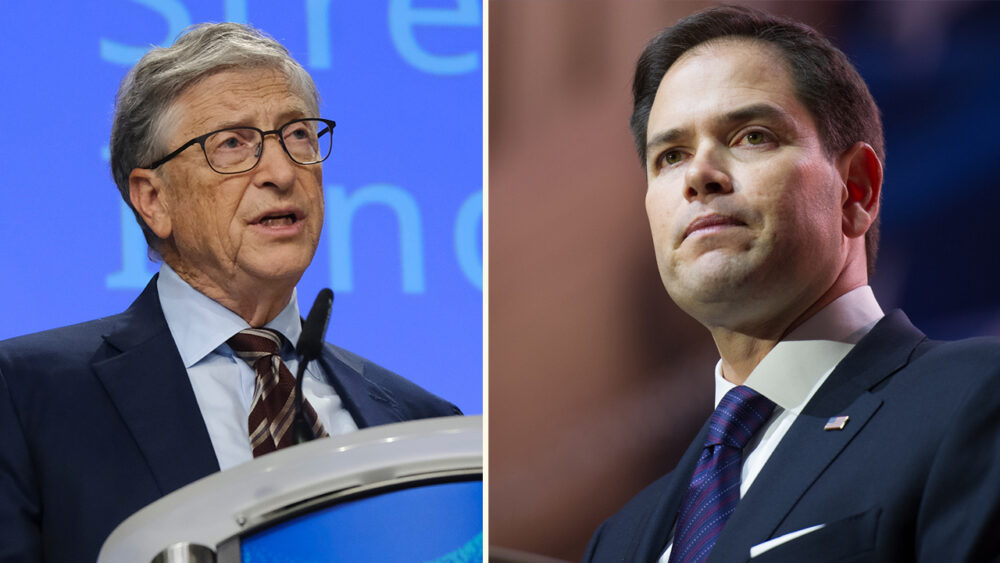On June 6, 2025, billionaire philanthropist Bill Gates made a discreet stop at the White House to press Secretary of State Marco Rubio to roll back steep reductions to foreign aid instituted by Elon Musk’s Department of Government Efficiency (DOGE). The cuts—totaling $8–9 billion—hit hard at USAID programs focused on HIV, AIDS, malaria, and other critical health initiatives in Africa.
The visit, first reported by veteran political journalist Tara Palmeri in her Red Letter newsletter, came just hours after former President Trump departed for Bedminster. Palmeri noted that Gates was seen entering the Eisenhower Executive Office Building around 4 p.m., reportedly in a last-ditch effort to capitalize on the Trump–Musk political rift, which had spilled into public view days earlier.
“With Musk on the outs, Gates clearly saw an opportunity to argue for the reversal of the DOGE cuts,” Palmeri reported.
What did Rubio say?
Despite the high-level ask, Rubio held the line. According to Palmeri’s sources, Rubio told Gates plainly: “The country is insolvent. We can’t pay back our debts.” A senior State Department official confirmed the meeting and emphasized that Rubio sees no justification for restoring the aid programs Musk dismantled.
“The Secretary’s position on making important and necessary cuts to foreign aid has not changed,” the official told the New York Post. “He does not believe U.S. taxpayers should be burdened with covering the costs for progressive projects abroad, including funding contraceptives, electric buses, and DEI.”
Rubio’s view reflects the broader Trump-era stance that foreign aid should only fund “true lifesaving programs” that align with direct U.S. interests.
Why it matters now
USAID—which once managed over $40 billion and employed more than 10,000 people—has undergone dramatic restructuring. On March 28, the State Department officially shuttered the agency following a court ruling upholding the DOGE-led cuts. As of June 10, Rubio ordered the termination of all remaining overseas USAID staff, fully consolidating aid efforts under State Department control.
Humanitarian fallout
An analysis from The Times of London estimated that the DOGE cuts could contribute to as many as 300,000 global deaths, with over 200,000 children potentially affected by disruptions to malaria, HIV, and maternal health programs. The figure, based on modeling by Boston University’s Brook Nichols, has been widely circulated by global health advocates and activists.
But the number remains highly disputed.
In testimony before the House Foreign Affairs Committee on May 21, Secretary of State Marco Rubio flatly rejected the claim:
“No one has died because of USAID [cuts],” he said, dismissing the figure as misleading and unsupported by evidence.
Rubio and others in the administration argue that much of the spending eliminated had little to do with urgent, lifesaving care and was instead tied to ideological or bureaucratic programs that failed to serve core U.S. interests.
Despite the warnings from aid groups, the administration contends that strategic reductions are both fiscally necessary and morally responsible in the context of record federal debt and public skepticism about global spending.
What’s next?
-
Legal pushback: Multiple lawsuits are challenging the legality of DOGE’s actions, including one from a coalition of NGOs and USAID staff arguing the agency’s dismantling violates Congressional authority.
-
Legislative efforts: Quiet efforts are underway in the Senate to reauthorize a scaled-down version of USAID’s health division, possibly under new branding.
-
Public pressure: Gates is expected to increase visibility around the issue, and has already hinted at launching a global campaign to restore bipartisan support for foreign aid.
Bill Gates’ private appeal to Secretary Rubio was a high-stakes intervention aimed at stopping what many global health leaders are calling a humanitarian disaster. But the Trump administration, bolstered by Musk’s cost-cutting playbook and Rubio’s ideological resolve, is signaling no intention to reverse course.


